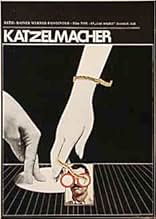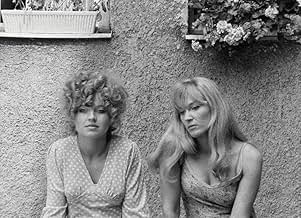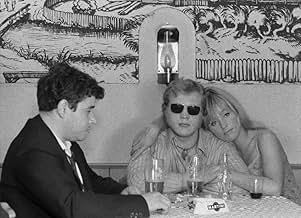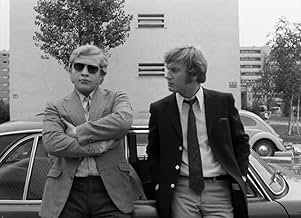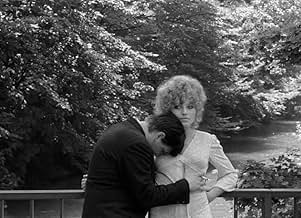CALIFICACIÓN DE IMDb
6.8/10
3.2 k
TU CALIFICACIÓN
La vida de un grupo de amigos es sacudida por la llegada de un inmigrante griego.La vida de un grupo de amigos es sacudida por la llegada de un inmigrante griego.La vida de un grupo de amigos es sacudida por la llegada de un inmigrante griego.
- Dirección
- Guionista
- Elenco
- Premios
- 8 premios ganados y 2 nominaciones en total
- Dirección
- Guionista
- Todo el elenco y el equipo
- Producción, taquilla y más en IMDbPro
Opiniones destacadas
This early Fassbinder film concerns a group of dissatisfied and directionless young people who turn their attentions away from themselves and the relationships within their inner circle when a young Greek man arrives looking for work and lodging. Soon the group rumour mill goes into overdrive as they perceive the young man as an outsider and so demonise and persecute him.
Another great character driven piece by the German maestro with the ugliest facets of human nature being explored as the members of the insular and narrow minded group start to spread rumours and make their prejudices known towards young Jorgos. After an innocuous chance meeting in the street with one of the women from the gang, the group's Chinese Whispers soon snowball to him having tried to rape her as well as other crimes such as him being a Communist.
The men of the group then seize their opportunity to beat him up for crimes he isn't guilty of.
Conformity, group hysteria and mobbing by the gang are all explored perceptively within Katzelmacher which makes it, unfortunately, ring all too true.
Beautifully acted, perfectly framed and directed and with a gorgeous late 60's black and white which is icy cool and absolutely gorgeous.
Look out for the scene of the young woman dancing.
Highly recommended.
Another great character driven piece by the German maestro with the ugliest facets of human nature being explored as the members of the insular and narrow minded group start to spread rumours and make their prejudices known towards young Jorgos. After an innocuous chance meeting in the street with one of the women from the gang, the group's Chinese Whispers soon snowball to him having tried to rape her as well as other crimes such as him being a Communist.
The men of the group then seize their opportunity to beat him up for crimes he isn't guilty of.
Conformity, group hysteria and mobbing by the gang are all explored perceptively within Katzelmacher which makes it, unfortunately, ring all too true.
Beautifully acted, perfectly framed and directed and with a gorgeous late 60's black and white which is icy cool and absolutely gorgeous.
Look out for the scene of the young woman dancing.
Highly recommended.
This movie is hard to find. I haven't seen it in years but remember the overall thing. 'Katzelmacher'is the best RWF ever threw at us. I read a review here earlier, a long synopsis...very interesting. I recall certain scenes. My fav, the walking pairs, threesomes, etc. all shown walking down the same alley gossiping, at various points in the film. A beautiful piano waltz accompanies each group as they walk. It struck me that RWF filmed all of these scenes one after the other in keeping with the motto of their clan of actors, "Cheaper, Faster, Better.", or something like that. If you notice, there's the same car parked in the background, and it appears the scenes were all shot about the same time of day. "Next!" The Peer Raben waltz is so beautiful. I played it on guitar at my father's funeral. I believe Peer called it 'Valse Katzelmacher'. I could be wrong on that, too. No matter, it's a heartfelt piece of music! I fell in love with this group of actors. It was always, "I wonder who's gonna be in this one?" and then..."Oh, Wow, Great! So, 'Katzelmacher', an absolute must for Kine buffs.
Even though Fassbinder made a few films before, I and other people generally regard 'Katzelmacher' as his true debut as it is the most recognized of his earliest works (similar to how Mean Streets is viewed among Scorsese's filmography). Regardless, it is without a doubt noticeable that we are dealing with a director's early work; IMO that works both in the film's favor as well as against it.
There is a very strict and stiff approach to the filmmaking, the camera is almost always stationary, and certain scenes follow a specific "template" with regard to the cinematography in the respective sequences (i.e. Every scene that takes place in front of the house features the same exact perspective and mise en scene, etc). Also, the way Fassbinder utilizes his characters and actors is very "theatrical", sometimes characters almost become part of the mise en scene themselves, and there is always a "focus" on a specific character who is talking; rarely are two people's lines overlapping which, again, makes it very theatrical which is fitting, considering how this used to be a stage play.
So far everything I said is both something I can praise and criticize which is odd, but makes this an interesting film to say the least.
Where I do think the film becomes dated is in how it approaches its subject matter of xenophobia; in that regard I think Fassbinder's later works are just a lot better ('Ali: Fear Eats the Soul' for example). The Greek immigrant, played by Fassbinder himself, is somewhat of a tacky, cartoonish depiction of a foreigner in Germany and the character is very underdeveloped. I totally get that Fassbinder wanted to focus on the xenophobic Germans and their ugly behavior (even outside their racism), but again, 'Ali: Fear Eats the Soul' has proven that the overall topic can work better if you properly develop the characters and feature multiple views on the situation at hand, which leads to a better film overall.
There is also a brief fight scene that is honestly embarassing to look at given how poorly the punches and kicks were choreographed, a minor scene in the overall film, but the fact that I am still thinking about it proves that it could have been done better... To summarize, the film contains enough interesting elements to be worth checking out today, but with regard to its content, I think Fassbinder did a better job later on in his (admittedly short) career. Out of the films of his that i have seen, this may be the weakest, but it is not terrible either.
There is a very strict and stiff approach to the filmmaking, the camera is almost always stationary, and certain scenes follow a specific "template" with regard to the cinematography in the respective sequences (i.e. Every scene that takes place in front of the house features the same exact perspective and mise en scene, etc). Also, the way Fassbinder utilizes his characters and actors is very "theatrical", sometimes characters almost become part of the mise en scene themselves, and there is always a "focus" on a specific character who is talking; rarely are two people's lines overlapping which, again, makes it very theatrical which is fitting, considering how this used to be a stage play.
So far everything I said is both something I can praise and criticize which is odd, but makes this an interesting film to say the least.
Where I do think the film becomes dated is in how it approaches its subject matter of xenophobia; in that regard I think Fassbinder's later works are just a lot better ('Ali: Fear Eats the Soul' for example). The Greek immigrant, played by Fassbinder himself, is somewhat of a tacky, cartoonish depiction of a foreigner in Germany and the character is very underdeveloped. I totally get that Fassbinder wanted to focus on the xenophobic Germans and their ugly behavior (even outside their racism), but again, 'Ali: Fear Eats the Soul' has proven that the overall topic can work better if you properly develop the characters and feature multiple views on the situation at hand, which leads to a better film overall.
There is also a brief fight scene that is honestly embarassing to look at given how poorly the punches and kicks were choreographed, a minor scene in the overall film, but the fact that I am still thinking about it proves that it could have been done better... To summarize, the film contains enough interesting elements to be worth checking out today, but with regard to its content, I think Fassbinder did a better job later on in his (admittedly short) career. Out of the films of his that i have seen, this may be the weakest, but it is not terrible either.
In this quietly scathing film from Fassbinder we have a portrait of a community and of a country. It happens to be West Germany, but could have been anywhere, and the words ' We belong here and no one else ' are as applicable today as they were back in 1969. The group are made up of men and women who talk to each other in front of a generic house with flowers on the window sills, and then they go to what they call a tavern and play cards and continue mouthing banalities that are so cruel and appalling that I wanted to close my ears to what I was hearing. The men when not talking abuse their women and this is portrayed as being casually ' normal, ' and one of the men is a male prostitute who kisses his male clients. Money and how to get it, criminally or otherwise dominates their conversations, if you can call them that. And they want the ' normality ' of this existence until a ' foreigner ' enters their community. Fassbinder himself plays this role and he is excellent. The foreigner is Greek and rumours start circulating such as his penis being bigger than the other men, and jealousy begins to enter this communal garden of evil. What happens next I will not reveal, but as in all Fassbinder the taking of money by fair means or foul is dominant. Personally I like Fassbinder's earlier films, and this I believe was close to the beginning of his incredible output. The near static nature and use of minimal sets has by some been put down to lack of money, but I believe he needed us, the viewers, to focus and the camera, almost unmoving, makes the content pitilessly accurate. I rate Fassbinder to be one of the handful of the greatest film directors and this film is in my opinion equal if not better than some of his last work. Sheer genius.
I think in big parts the film is about dynamics. Different couples with different dynamics. One couple in which the man treats his woman harshly, one in which he treats her more tenderly (until he is eager for more money) and one in which the woman has the upper hand in the household, apparently because she brings home the money. Yet they all seem to be in love with their partner and they are all friends with each other.
Money also plays an important role overall. Those who have money are more oppressive and dominating. As if having money gives one more of a right to tell your partner what he or she should do in things that have nothing to do with money. Two of the men consider doing something illegal, that should bring big bucks. This was the cause for some quarrels with their women who found the idea appealing but didn't want to risk it. We never learn what it was they had planned and eventually they dropped the idea. But the relationships with their women were hurt permanently by this dispute.
Everyone seemed to have sex with everyone (except the ugly woman), without being much of an issue, but hey, it was 1969. In fact, it only was an issue when one of the women demanded money for it. It made her a whore, but the other women doing it for free didn't make them whores. Except for maybe the woman who was said to have sex with the guest-worker from Greece.
The scenes of always two different characters walking, with the melancholic music I understood this way that the two people talk differently to each other when they are among themselves. Always more tender, no matter which two people it were. But once there are at least three people the dynamics change for the worse.
At the beginning I found the film quite alien, because of the apparent disjointness of the scenes, but the better I knew the characters the more drawn in I was and I soon started to get something out of most scenes. It was also alien because I was not used to the way they talk. Pretty stagy in pronunciation and phrasing. This could possibly be contributed to the fact that the cast and writer/director Fassbinder all came from theater with little film experience at that point.
There was no sense of time. It just goes from one conversation to another. From the dialogue you could gather that a lot of time passed overall, but it isn't really important to know how much. It was just important for the movie so to not have the plot stagnating, to see different sides of the characters. Although it could also be argued again that you don't get a sense of time passing because Fassbinder didn't yet know any better, since he was rather new to the medium of film.
Money also plays an important role overall. Those who have money are more oppressive and dominating. As if having money gives one more of a right to tell your partner what he or she should do in things that have nothing to do with money. Two of the men consider doing something illegal, that should bring big bucks. This was the cause for some quarrels with their women who found the idea appealing but didn't want to risk it. We never learn what it was they had planned and eventually they dropped the idea. But the relationships with their women were hurt permanently by this dispute.
Everyone seemed to have sex with everyone (except the ugly woman), without being much of an issue, but hey, it was 1969. In fact, it only was an issue when one of the women demanded money for it. It made her a whore, but the other women doing it for free didn't make them whores. Except for maybe the woman who was said to have sex with the guest-worker from Greece.
The scenes of always two different characters walking, with the melancholic music I understood this way that the two people talk differently to each other when they are among themselves. Always more tender, no matter which two people it were. But once there are at least three people the dynamics change for the worse.
At the beginning I found the film quite alien, because of the apparent disjointness of the scenes, but the better I knew the characters the more drawn in I was and I soon started to get something out of most scenes. It was also alien because I was not used to the way they talk. Pretty stagy in pronunciation and phrasing. This could possibly be contributed to the fact that the cast and writer/director Fassbinder all came from theater with little film experience at that point.
There was no sense of time. It just goes from one conversation to another. From the dialogue you could gather that a lot of time passed overall, but it isn't really important to know how much. It was just important for the movie so to not have the plot stagnating, to see different sides of the characters. Although it could also be argued again that you don't get a sense of time passing because Fassbinder didn't yet know any better, since he was rather new to the medium of film.
¿Sabías que…?
- TriviaShot in nine days.
- Créditos curiososEs ist besser neue Fehler zu machen, als die alten bis zur allgemeinen Bewußtlosigkeit zu konstituieren (Yaak Karsunke)
- ConexionesFeatured in Century of Cinema: Die Nacht der Regisseure (1995)
Selecciones populares
Inicia sesión para calificar y agrega a la lista de videos para obtener recomendaciones personalizadas
- How long is Katzelmacher?Con tecnología de Alexa
Detalles
Taquilla
- Presupuesto
- DEM 80,000 (estimado)
- Total en EE. UU. y Canadá
- USD 8,144
- Fin de semana de estreno en EE. UU. y Canadá
- USD 11,623
- 16 feb 2003
- Total a nivel mundial
- USD 8,158
- Tiempo de ejecución
- 1h 28min(88 min)
- Color
- Mezcla de sonido
- Relación de aspecto
- 1.37 : 1
Contribuir a esta página
Sugiere una edición o agrega el contenido que falta

